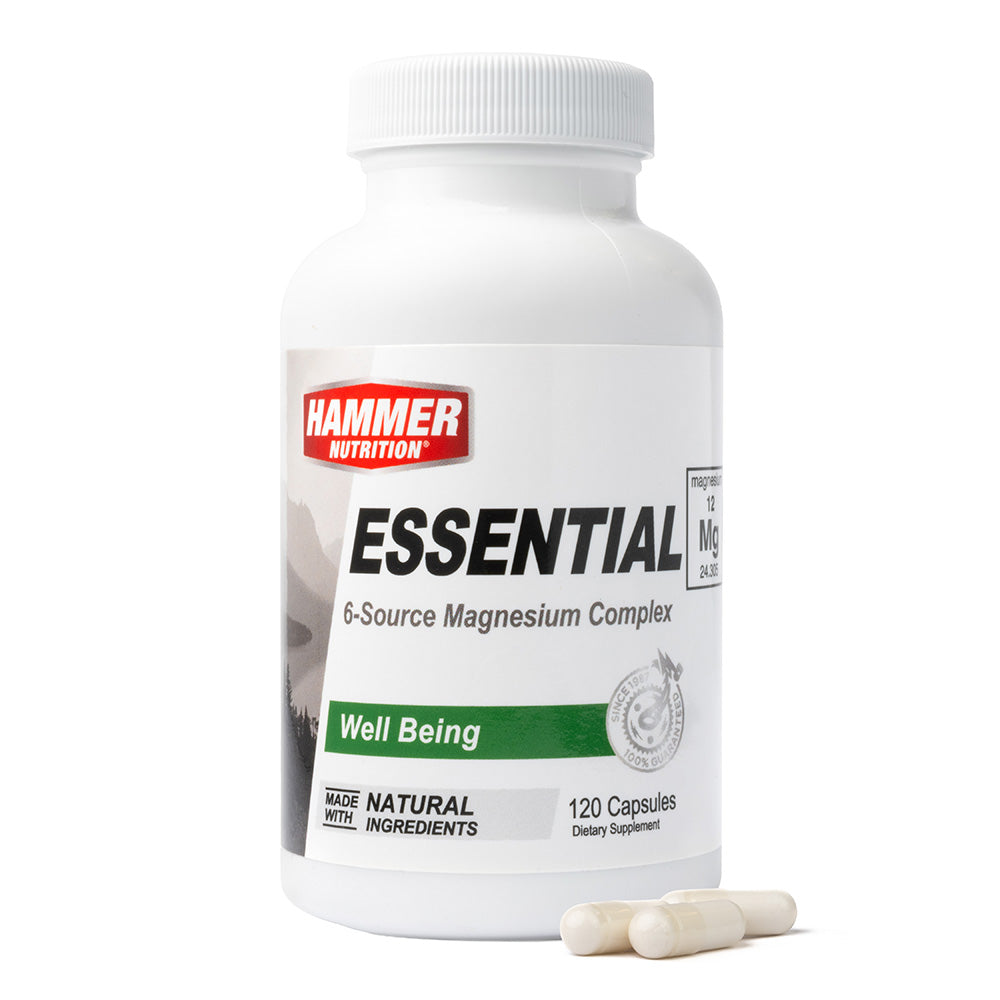
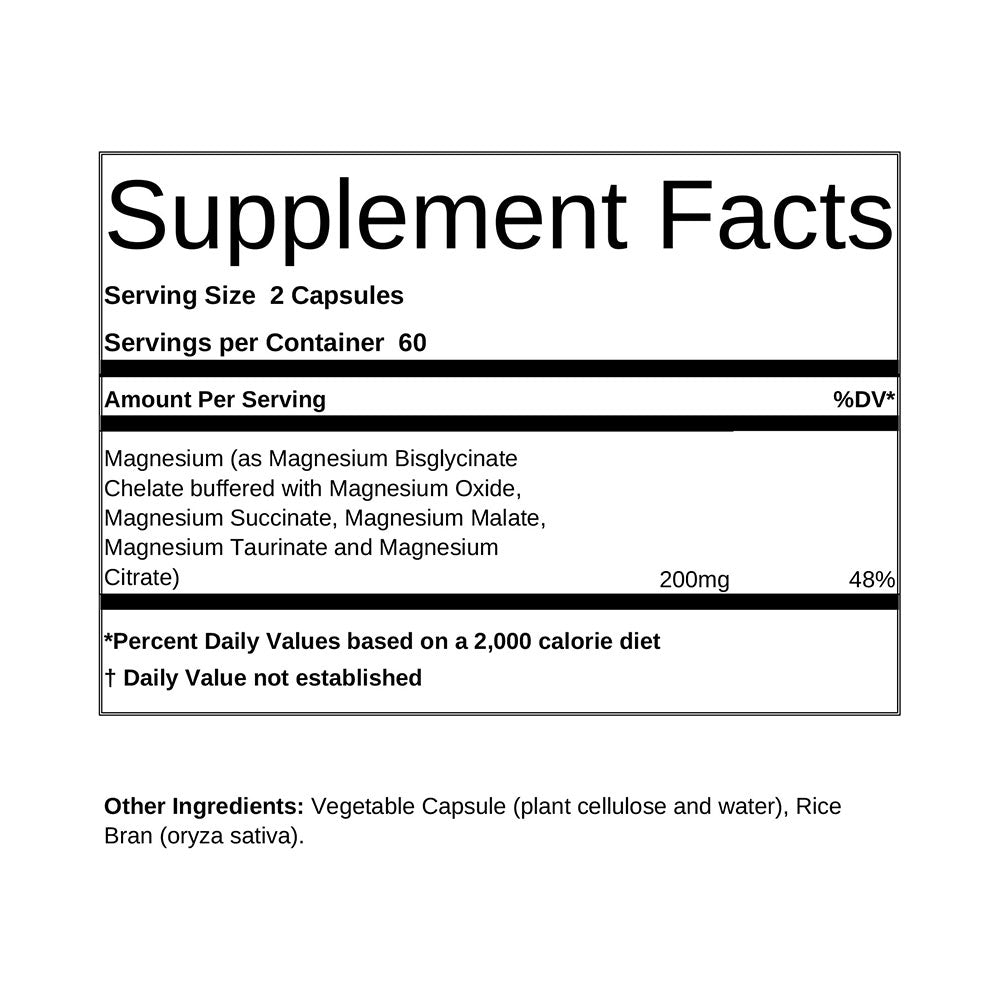

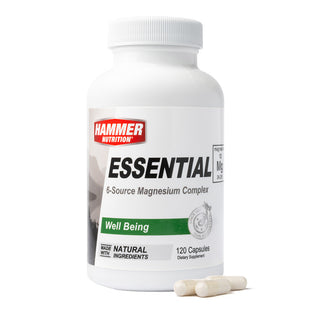
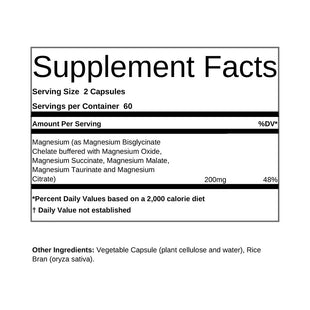
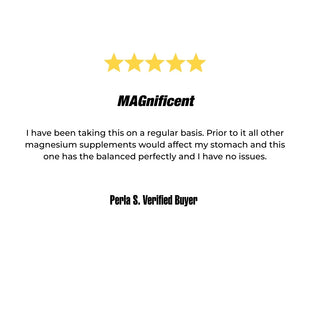

Essential Mg
- Helps relieve spasms, cramps and tightness
- Supports optimal magnesium levels
- Helps sleep**
- Product good for 60 months after MFG date






With studies suggesting that over 80% of us are deficient in magnesium (Mg), and with this mineral being so crucially involved in hundreds of bodily functions, it’s no wonder why we named our product Essential Mg. Combining five forms of highly bioavailable magnesium, Essential Mg supplies your body with pure, optimally absorbable magnesium, free of the side effects typical of inferior forms. Supplement daily with Essential Mg and enjoy the myriad benefits this “key to health and life” mineral provides.
- How much magnesium should I take daily?
- What would you recommend to help in the healing process of a bone fracture?
- How serious is insufficient sleep and how can I address that?
- Could you tell me more about the forms of magnesium found in Essential Mg?
- Does supplementing with magnesium maximize vitamin D’s benefits?
- Why is magnesium considered to be more important than calcium for bone health?
- What kind of diet should I be looking at for prediabetes?
- Are your supplements 3rd party tested?
- Why is there magnesium oxide in Essential Mg?
How much magnesium should I take daily?
The government-set Recommended Daily Allowance (RDA) for magnesium is 420 mg a day for males and 320 mg a day for females. A more appropriate amount to aim for, however, is the Optimal Daily Intake (ODI) standard of 500-750 mg of magnesium. Dr. Shari Lieberman, who developed the ODIs, states: "In order to attain a state of optimum health and disease prevention, we must take into our bodies' optimum - not minimum - amounts of vitamins and minerals.”
Magnesium expert Mildred Seelig suggests even more precise dosages of 2.7 mg of magnesium per pound of body weight, with those under severe chronic stress or engaged in strenuous work/athletic training needing a dose of up to 4.5 mg of magnesium per pound of body weight.
EXAMPLES:
- Normal daily dose: 160-pound person x 2.7 mg = 432 mg of magnesium daily
- Moderate stress/medium training volume dose: 160-pound person x 3.3 mg = 528 mg of magnesium daily
- Severe chronic stress/highest training volume period dose: 160-pound person x 4.5 mg = 720 mg of magnesium daily
What would you recommend to help in the healing process of a bone fracture, and also to maintain bone strength going forward?
Here are the following supplements that will be really helpful in not only fully healing the bone, but to strengthen it more and more.
1) Premium Insurance Caps. Many nutrients contribute to bone health, and, of course, overall health. Vitamin C, vitamin D, vitamin B6, magnesium, calcium, selenium, zinc, and more play a bone-healing role. Suggested dose: 2 capsules 2-3 times daily.
2) Essential Mg. For too long, people have been under the impression that taking lots and lots of calcium was necessary to help with bone healing and also to help prevent osteoporosis. And while calcium is indeed an important nutrient, it's actually magnesium that is the most important... and for a slew of reasons in addition to bone health. It is so important, in fact, that we’ve included an article regarding magnesium's role in bone health...
Magnesium – Mightiest Mineral for Bone Health
By: Steve Born
In Endurance News #103, I wrote about an article that discussed the importance of magnesium in maintaining optimal bone health. The bottom line was that while calcium, vitamin D, and a couple other nutrients certainly play a role in bone health, I believe that it is magnesium that is “driving the train.” A portion of the article states:
A strong case can be made for magnesium as the most important component for bone health instead, especially because magnesium is necessary for the proper utilization of vitamin D and calcium.
Dr. Susan Brown writes, “Since magnesium participates in an astonishing array of biochemical reactions, it’s no surprise that it’s essential for healthy bones. Most notably, adequate magnesium is essential for absorption and metabolism of calcium.”
More recent research appears to confirm this rationale. A study [1] conducted by researchers from the Universities of Bristol and Eastern Finland showed that higher serum levels of magnesium greatly decreased the risk of bone fractures.
The researchers followed nearly 2,250 middle-aged men over a 20-year period and found that the risk of having a bone fracture—particular a fracture of the hip—was decreased by an astounding 44% in men with higher blood levels of magnesium. Researchers also noted that the 22 men with the highest magnesium levels had no incidence at all with bone fractures over the entire 20-year period.
Lead researcher, Dr. Setor Kunutsor, states: "The findings do suggest that avoiding low serum concentrations of magnesium may be a promising though unproven strategy for risk prevention of fractures."
While magnesium arguably being the key mineral for bone health—including the very real potential for helping prevent fractures—may be news for some, magnesium expert, James South, wrote about it decades ago. In his hallmark article “Magnesium, The Key to Health and Life,” and referencing the work of Dr. Guy Abraham from the early 80’s, South writes:
"Magnesium stimulates release of the hormone calcitonin, which drives calcium into the bones where it belongs, and out of the soft tissues where it doesn't. A high-calcium, low-magnesium diet and cellular environment will thus tend to favor calcification of soft tissues as osteoporosis gradually develops. Abraham points out that Asian and African diets are low in calcium (300 to 500 milligrams daily), yet high in magnesium, and osteoporosis is not more common in Asia and Africa than in Europe and America, where daily calcium intakes from high-dairy diets are often 800 to 1,000 milligrams daily, combined with low magnesium."
Abraham notes, "When patients with severe osteoporosis were given massive doses of calcium they went into positive calcium balance, but radiographic studies revealed no change in the osteoporotic process. Where did that calcium go? Obviously into the soft tissues where it does not belong.” Abraham adds, “Magnesium has a calcium-sparing effect and decreases the need for calcium.” [2]
This exciting new research, along with previous studies, confirms the key role that magnesium plays in bone health.
As I’ve mentioned before, “Unfortunately, while magnesium is contained in a variety of foods, the overall degradation of our food supply has caused the average American intake to decline to amounts significantly below Optimum Daily Intake (ODI) levels. Therefore, to ensure you’re obtaining adequate amounts of magnesium, select foods that contain substantial levels of this vital mineral (seeds and nuts are good sources), and augment your intake with additional amounts of magnesium via supplementation.
Essential Mg contains five forms of highly bioavailable magnesium. From supporting optimal bone health to so much more, Essential Mg is an ideal way to ensure that you’re receiving optimal amounts of this all-important, health-benefiting mineral.
REFERENCES:
[1] Setor Kwadzo Kunutsor, Michael Richard Whitehouse, Ashley William Blom, Jari Antero Laukkanen. Low serum magnesium levels are associated with increased risk of fractures: a long-term prospective cohort study. European Journal of Epidemiology, 2017; DOI: 10.1007/s10654-017-0242-2
[2] Abraham G. The calcium controversy. J Appl Nutr 1982, 34:69-73.
Suggested Dose: 2 Essential Mg in the morning, 1 at lunchtime or early afternoon, and 1-2 at bedtime (at night, magnesium is very helpful for helping the muscles and nerves relax).
3) EnDuro D. Regarding bone health, the benefits from vitamin D3 supplementation are to support proper utilization of calcium to optimize bone density and overall bone health. Vitamin K2 works with vitamin D3 for supporting bone health by activating a protein called osteocalcin, which helps keep calcium out of the arteries while increasing the amount of calcium in the bones (teeth as well). Suggested Dose: 1 capsule is a sufficient amount on a daily basis. For bone repair, 1 capsule twice daily is suggested.
4) Boron. This trace mineral is extremely important for many aspects of health, and it is vitally important for maintaining and improving bone health because of the role it plays in assisting with the bone-building effects of calcium, magnesium, and vitamin D. Studies show that adequate intake of boron reduces the loss of calcium and magnesium excreted in the urine. That ensures that more of these two important minerals stay in the body. Suggested Dose: Exactly the same as EnDuro D.
5) Whey Protein. A lot of people don’t think about protein when it comes to bone health, but this bit should convince otherwise. Bone can be imagined as being somewhat like a sponge made of living protein upon which mineral crystals are embedded. By volume, roughly half of bone is comprised of protein. When a fracture occurs, the body is called upon to gather protein building blocks together to synthesize a new structural bone protein matrix. In addition, protein supplementation increases growth factors like insulin-like growth factor-1 (IGF-1), a polypeptide that exerts a positive effect on skeletal integrity, muscle strength, immune response, and bone renewal. Protein malnutrition or under-nutrition leads to a “rubbery” callus, compared to the rigid calluses of those with adequate or high protein intake. Numerous studies document the acceleration of fracture healing with even a modest 10- to 20-gram increase in protein intake. The benefits of supplemental protein are important to everyone and especially important to those with malnutrition or low baseline protein intake. In fact, among elderly hip fracture patients, poor protein status at the time of fracture predicts fracture outcome. Those with low protein status take longer to heal, and have more complications, including death.
Specific amino acids of special importance include lysine, arginine, proline, glycine, cystine, and glutamine. Lysine, for example, is known to enhance calcium absorption, increase the amount of calcium absorbed into the bone matrix, and aid in the regeneration of tissue.
Suggested Dose: 1 scoop of Hammer Whey protein mixed in water only at bedtime + an optional dose of ½ to 1 scoop mixed in water with added fruit (smoothie) during the day will prove to be highly beneficial for bones, muscles, and immune system.
6) Tissue Rejuvenator. While not directly related to bone health, the nutrients in Tissue Rejuvenator will provide potent benefits for alleviating soreness, aches, and swelling, while also helping strengthen all of the connective tissue surrounding the bones. Suggested Dose: 2 capsules twice daily is our suggestion.
7) LSA Caps. This product, as well as Premium Insurance Caps, contains this trace mineral. The roles selenium plays in bone health are complex, but it is believed that a portion of its importance comes via its antioxidant properties. As part of the glutathione peroxidase antioxidant enzyme, selenium helps neutralize reactive oxygen species (ROS) free radicals. Levels of selenium that are too low can lead to higher ROS levels, which is considered to be a primary culprit in the development of osteoporosis. Low levels of selenium at also associated with lower bone mineral density (BMD), which decreases bone strength and increases the risk of fractures and osteoporosis. Suggested Dose: 2-4 capsules of Premium Insurance Caps (57 - 86 mcg) and 4 capsules of LSA Caps (100 mcg) daily will supply you with an ideal amount of selenium.
How serious is insufficient sleep and how can I address that?
The conclusions of a recent study involving 8,000 participants: 50+ year-old individuals who sleep 5 hours or less a night may be at risk for several serious and chronic health conditions, ranging from heart disease to cancer.
The research, published online October 18 in PLOS Medicine [1], found that compared to those who slept 7-8 hours, individuals who slept less than 5 hours had a 30% increase in many health issues including:
- Arthritis
- Cancer
- Chronic kidney disease
- Chronic obstructive pulmonary disease
- Coronary heart disease
- Dementia
- Depression
- Diabetes
- Heart Failure
- Liver Disease
- Parkinson’s disease
- Stroke
Those in their 60’s who slept less than 5 hours were shown to have a 32% higher risk, while those in their 70’s, a 40% increased risk was found.
Lead investigator, Dr. Séverine Sabia, PhD, states, "It is important to take care of our sleep." Dr. Sabia noted that the source of the sleep problem must be addressed, but for those who don’t have a medical reason for insufficient sleep, she further went on to say that “Healthy sleep habits are a must. These include keeping a regular sleep schedule, a healthy lifestyle — physical activity and light exposure during the day, and a light dinner — and avoidance of screens for a half hour before sleep."
While allowing for the fact that “chronic diseases often coexist, particularly at older ages, it remains unclear how sleep duration may be associated with risk of multimorbidity,” Dr. Sabia also emphasized, "Sleep is important for the regulation of several body function, such as metabolic, endocrine, and inflammatory regulation over the day, that in turn, when dysregulated, may contribute to increased risk of several chronic conditions."
Hammer’s Superior Sleep-Enhancing Trio
Hammer CBD – Our clients consistently tell us that they haven’t experienced a more powerful, yet safe and natural way to enhance sleep quality and duration. The phytocannabinoids in Hammer CBD augment the body’s natural production of cannabinoids while influencing the CB1 receptors, allowing them to function better. This dramatically helps promote calmness, relaxation, and better-quality sleep and support for the immune system. [2]
REM Caps – For nearly two decades, the unique and safe, non-habit-forming nutrient combination in REM Caps has helped thousands of people enjoy more sound, restful, and productive sleep. The main component in REM Caps’ main ingredient is melatonin, which research has shown significantly reduces the amount of time needed to fall asleep, boosts the amount of time spent asleep, and increases sleep duration. [3]
Essential Mg - Of the hundreds of roles magnesium plays in the body, one of the primary benefits for aiding sleep is that it helps the muscles and nerves to relax. Magnesium supplementation, especially when combined with other nutrients—such as those found in REM Caps—has been shown to reduce incidences of insomnia. [4]
Summary
I am oftentimes reminded of the words of highly respected coach Nate Llerandi, who labeled the lack of quality sleep the ultimate performance killer. Coach Llerandi states, “Sleep deprivation can put you in one of the holes you’ll ever experience. It goes hand in hand with overtraining, erratic training, and poor performances.” Dr. Bill Misner elaborates: "Deep sleep patterns may mean the difference between big anabolic gains and none at all! Both bodily repair and anabolic growth occur only during quality rest, and when deep sleep patterns become routine. While lack of sleep can have dire consequences, adequate sleep provides only positive, healthful benefits.”
It's obvious: if you're not obtaining the right amount of high-quality sleep every night, not only is your athletic performance being sabotaged, so too is your overall health! To ensure that you obtain the right amount of high-quality sleep, put the Hammer Nutrition “Sleep-Enhancing Trio” to work for you!
REFERENCES:
[1] https://journals.plos.org/plosmedicine/article?id=10.1371/journal.pmed.1004109
[2] https://www.ncbi.nlm.nih.gov/pmc/articles/PMC3256323/
[3] Brzezinski A, Vangel MG, Wurtman RJ, et al. Effects of exogenous melatonin on sleep: a meta-analysis. Sleep Med Rev. 2005 Feb;9(1):41-50.
[4] Sateia MJ, Nowell PD. Insomnia. Lancet. 2004;364:1959–73.
Could you tell me more about the forms of magnesium found in Essential Mg?
Essential Mg contains the following five highly bioavailable forms of magnesium:
- Magnesium bisglycinate is magnesium chelated (bonded) to the amino acid glycine and is touted for its high absorption rates. It’s also the form of magnesium considered to have the least amount of potential to cause a laxative effect, common with forms such as oxide.
- Magnesium succinate is magnesium chelated to succinic acid. This compound yields one the highest amounts of elemental magnesium while providing the body with a Krebs cycle intermediate that not only plays a role in energy production but is also involved in the rebuilding of muscle fiber and nerve endings.
- Magnesium citrate is magnesium chelated to citric acid, a key Krebs cycle intermediate noted for its ability to help alleviate fatigue as well as playing a role in relieving symptoms of asthma and hypertension.
- Magnesium malate is magnesium chelated to malic acid and it’s the most common form of magnesium used for alleviating fibromyalgia. Malic acid (malate) is a Krebs cycle intermediate, touted for its energy enhancing, fatigue-alleviating effects. Malic acid also supports enhanced exercise performance by counteracting the buildup of lactic acid.
- Magnesium taurinate (aka magnesium taurate) is magnesium bonded to the amino acid taurine. Because both magnesium and taurine are associated with cardiovascular health, magnesium taurate is often referred to as the “heart health” form. Among its many benefits, taurine assists in regulating heartbeat and muscle contractions.
Does supplementing with magnesium maximize vitamin D’s benefits?
Yes! To get the full value of the plentiful benefits from the vitamin D in EnDuro D, you need sufficient amounts of magnesium. This is because magnesium activates the enzymes involved in vitamin D metabolism. In one study, researchers stated that it is “essential to ensure that the recommended amount of magnesium is consumed to obtain the optimal benefits of vitamin D.” [1]
Another study [2] indicates that magnesium also optimizes vitamin D “status” in the body—increasing it in people with deficient levels and lowering in people with too-high levels. This, researchers believe, is vital because people synthesize vitamin D differently; in some individuals, vitamin D levels were found to not rise even after being given high doses of the vitamin. Using magnesium in vitamin D studies, and via magnesium’s “raising/lowering vitamin D levels as needed” properties, more-reliable conclusions can be achieved in research regarding conditions related to vitamin D levels. Additionally, thanks to magnesium’s ability to balance and optimize vitamin D levels, more people will be able to enjoy the plethora of benefits that come from optimal—not too low, not too high—blood levels of this all-important vitamin.
With each capsule containing 100 mg of magnesium from five highly bioavailable forms, Essential Mg is the easy way to provide your body with this “necessary for vitamin D utilization” mineral.
REFERENCES:
[1] https://jaoa.org/article.aspx?articleid=2673882
[2] Magnesium status and supplementation influence vitamin D status and metabolism: results from a randomized trial; Qi Dai Xiangzhu Zhu JoAnn E Manson Yiqing Song Xingnan Li Adrian A Franke Rebecca B Costello Andrea Rosanoff Hui Nian Lei Fan Harvey Murff Reid M Ness Douglas L Seidner Chang Yu Martha J Shrubsole; The American Journal of Clinical Nutrition, Volume 108, Issue 6, 1 December 2018, Pages 1249–1258, https://doi.org/10.1093/ajcn/nqy274
Why is magnesium considered to be more important than calcium for bone health?
Magnesium, calcium, and several other nutrients all play a role in bone health. However, after reviewing 10 years of medical tests involving over 2,700 people, scientists found an association between calcium supplements and an increased risk of arterial plaque buildup and heart damage.
Dr. Erin Michos of the Ciccarone Center for the Prevention of Heart Disease at the Johns Hopkins University School of Medicine states that his study adds to the body of evidence that excess calcium in the form of supplements may harm the heart and vascular system.
“Considering that 99% of the total body calcium is located in the bones, it is not surprising that academic proponents of high calcium intake have used as an argument the possible role of calcium deficiency in osteoporosis,” says magnesium expert Dr. Guy Abraham. “There is no evidence, however, to support this view. Osteoporosis is not more common in those parts of Asia and Africa where diets are relatively low in calcium (300-500 mg/day) than in Europe and North America where consumption of dairy products contributes to more than1000 mg of calcium/day. Also, when patients with severe osteoporosis were given massive doses of calcium, they went into positive calcium balance, but radiographic studies revealed no changes in the osteoporotic process. So where did that calcium go? Obviously into the soft tissues where it does not belong.”
A strong case can be made for magnesium as the most important component for bone health instead, especially because magnesium is necessary for the proper utilization of vitamin D and calcium.
Dr. Susan Brown writes, “Since magnesium participates in an astonishing array of biochemical reactions, it's no surprise that it's essential for healthy bones. Most notably, adequate magnesium is essential for absorption and metabolism of calcium.”
Two separate studies published in the American Journal of Clinical Nutrition showed that insufficient magnesium intake lowered bone minerals, while adequate dietary magnesium intake increased bone mineral density, helping reduce the risk of osteoporosis and related bone fractures.
Speaking solely on bone health and osteoporosis prevention, magnesium is arguably the mineral that is driving the train. Calcium does play an important role in the health of bones, but new research suggests that excess calcium intake, a common practice, can negatively impact heart health.
What kind of diet should I be looking at for prediabetes?
Q: I’ve been diagnosed with prediabetes. What kind of diet should I be looking at, and what supplements may help me?
A: As far as diet is concerned, there’s an excellent article from Johns Hopkins Medicine. In that article there’s a link to the Mediterranean Diet, which, unsurprisingly, in 2023 received the #1 rating for “Best Diet Overall” for the 6th straight year. Following that diet as much as possible will be the most important thing you can do.
Regarding supplements, the magnesium in Essential Mg is excellent for a plethora of reasons; it provides so many benefits, including playing a role in stabilizing blood sugar. Studies have shown that magnesium participates in insulin secretion and function, and low magnesium levels are correlated with insulin resistance. Other research reveals that magnesium levels are significantly more common in people with diabetes and impaired glucose tolerance compared with the general population, and higher magnesium levels correlate with lower HbA1C (see What is HbA1C for more on HbA1C). Other research suggests that higher magnesium intake is associated with decreased risk of developing type 2 diabetes.
Another key nutrient for protecting against diabetes is the trace mineral chromium (Chromium GTF), and it works in tandem with the magnesium in Essential Mg.
Vitamin C is excellent for lowering post-meal blood sugar levels, elevated post-meal blood sugar level surges being especially problematic for prediabetics and diabetics. Of the dozens of naturally occurring compounds in citrus fruit (aka bioflavonoids), there is one bioflavonoid called hesperidin that is especially beneficial, with one research study concluding, “Digestion of hesperidin produces a compound called hesperetin along with other metabolites. These compounds are powerful free radical scavengers and have demonstrated anti-inflammatory, insulin-sensitizing, and lipid-lowering activity.” Our Endurance C is the best, most complete vitamin C on the market, and it includes an outstanding amount of hesperidin.
EndurOmega contains omega-3 fatty acids. These healthy fats are found in fish and some nuts and seed. Research concluded that “diets rich in omega-3 fatty acids have been shown to promote weight loss, enhance insulin sensitivity, and reduce death from cardiovascular disease by reducing inflammation, improving lipid profiles, and reducing blood clotting. When omega-3 fats are incorporated into cell membranes, they make the cell surface more fluid and pliable and appear to enhance cells’ ability to remove glucose from the bloodstream.”
The r-alpha lipoic acid in Mito Caps plays numerous important roles in human health. Research shows that this powerful antioxidant decreases oxygen free radicals, which in excess promote endothelial dysfunction and contribute to diabetes, high blood pressure, and cardiovascular disease.
Are your supplements 3rd party tested?
Yes, every Hammer Nutrition supplement is 3rd party tested in compliance with the FDA’s regulations, 21 CFR Part 111 – Dietary Supplements. All the raw materials for each supplement we produce are tested for purity, strength, identity, and integrity. In addition to raw material testing, every Hammer Nutrition supplement is also tested in every stage of production—blending, encapsulation / powder-filling, packaging components and finished goods—before being released for distribution.
Why is there magnesium oxide in Essential Mg?
The primary form of magnesium used in Essential Mg is magnesium bisglycinate, which is magnesium attached to two glycine (amino acid) molecules. Magnesium bisglycinate is considered to be the best-absorbed and most bioavailable form of this mineral. However, this form is also extremely acidic, so a small amount of magnesium oxide (magnesium + oxygen) has been included to act as a buffer to help increase the alkalinity of the formula and minimize any stomach irritation issues.
General Support
Take 2–4 capsules with meals. For better absorption, split dosage between two meals if convenient.
Sleep/Restless Legs
Take 2–4 capsules before bed instead of taking them early in the day.
PRO TIPS
Magnesium is crucial for proper muscle contraction, nerve function, carbohydrate metabolism, ATP activation, protein synthesis, blood pressure normalization, blood sugar level regulation, and at least 300 other body processes.
Optimal bone health is just one of the massive benefits of supplementing with Essential Mg.
Magnesium Bisglycinate is magnesium chelated (i.e. “bonded”) to the amino acid glycine. It is the form of magnesium considered to have the least potential of causing a laxative effect.
Magnesium Succinate is magnesium chelated to succinic acid, a Krebs cycle intermediate.
Magnesium Citrate is magnesium chelated to citric acid, a Krebs cycle intermediate.
Magnesium Malate is magnesium chelated to malic acid, a Krebs cycle intermediate.
Magnesium Taurinate is magnesium chelated to the amino acid taurine.
Magnesium Oxide (magnesium + oxygen) has been included to act as a buffer to help increase the alkalinity of the formula and minimize any stomach irritation issues.
|
Supplement Facts |
||
|---|---|---|
| Serving Size: 2 Capsules Servings Per Container: 60 |
||
| Amount Per Serving | % Daily Value* | |
| Magnesium | 200mg | 48% |
| (Magnesium Bisglycinate Chelate buffered with Magnesium Oxide, Magnesium Succinate, Magnesium Malate, Magnesium Taurate and Magnesium Citrate) | ||
| * The Percent Daily Values are based on a 2,000 calorie diet. Your daily values may be higher or lower depending on your calorie needs. † Daily Value not established. |
||
| Other Ingredients: Vegetable Capsules (plant cellulose and water), Rice Bran (Oryza Sativa) ** These statements have not been evaluated by the Food and Drug Administration. This product is not intended to diagnose, treat, cure or prevent any disease. |
||



